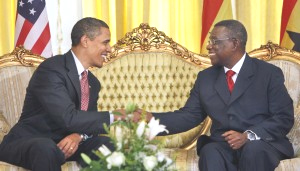Obama’s Ghana Visit: What does it Portend for Africa?

 |
| Obama with Atta Mills Photo courtesy |
In his address to Africa from
The speech was also directed at African leaders who trooped to the funeral of the recently deceased president of Gabon, Omar Bongo, generously showering praise and eulogizing a long-running autocrat widely known to have stolen his country’s oil wealth to become one of the richest Presidents on the Continent.
Now, because such characters abound on our continent, it became rapidly clear that the 47 year old man couldn’t have addressed the issues without seeming to be undermining the intelligence of all Africans in the process. Indeed somebody remarked right after his speech,” I felt insulted…” Many Africans must have felt insulted too at a point in his speech but they would also admit that Obama couldn’t have said them any more intelligently.
Significantly, although President Obama’s sermon was nothing new, as he reechoed what is already in us and what Africa’s great leaders have always stood for, his visit points to Ghana as the path for Africa’s political development. His continuous reference to the building of democratic principles and institutions essentially assumed the character of his speech. We will take time to visit the spirit of the speech too but for now, it is the character.
He said, “In the 21st century, capable, reliable, and transparent institutions are the key to success—strong parliaments; honest police forces; independent judges; an independent press; a vibrant private sector; a civil society. Those are the things that give life to democracy, because that is what matters in people's everyday lives…”
In a continent where conflict is a way of life; leaders steal and brutalize humanity without cringing; Rule of Law is utopian; military coups recur; women are raped, babies pounded and hands and legs of otherwise productive men amputated because of tribe or political affiliation, we couldn’t have agreed with him more. In such an environment, hope becomes a revolutionary aspiration and once again, the only people who are usually able to fall on it convincingly to bring about the needed change are our ordinary men and women, mothers and children. This is exactly what they did when they fought to bring independence to
As old men and women, lettered and unlettered, sat listening to the brilliant Youngman preach on the features and gains of democracy, the need for quality health care, an end to conflict and the realization of opportunity, whatever must have been going on in their minds will gradually result in the causal acceptance of the youth as being able to contribute meaningfully in politics and governance when given the chance.
Barely a week after President Obama’s departure, Ghanaian youths reportedly stormed the Parliament demanding for the passage of a National Youth Policy. Already, our curios and adventurous youths all across the continent have made dominant strides in the ICT world; they are involved in businesses and inventions and are already beginning to look inward for answers. Before Obama would say that “We must start from the simple premise that Africa's future is up to Africans”, these Africans had already converted their energies to building exactly what Obama came to admire, “a Kenyan Per capita economy larger than South Korea’s before he was born.”
President Obama added that “Disease and conflict have ravaged parts of the African continent” and even went on to admit that “The West has often approached
The perfidy of these artifices cannot be too strongly denounced because in it lies America’s way forward, not Africa’s way forward, taking into account America’s foreign policy which places loyalty in permanent interest over friends. Although he did not touch on African Unification which is clearly in Africa’s interest, the real motive of their
It was shocking to find in Eritrea just three years ago that shop owners and keepers could leave their shops open for prayers to the mosque and back to find everything intact; they have an honest and upright police force who would not accept or ask for a dime for service rendered or an appreciated service; and an unlettered market men and women who advance their trade with measuring scales, indicating their mathematical abilities and their great potential to develop.
Our leaders therefore, must recommit themselves to their separate oaths of office and collectively lead to protect the sovereign interest of the people. From today, they must bear in mind that in all their relationships with the world overseas, the key consideration must be not merely the superficial or even intrinsic advantage of such relationships for the given African country but the obligation to the African continent as a whole. However, our affirmations will be hollow unless we accept this approach as the principal guide to our actions.
By Ernesto Yeboah,
Mr Ernesto is a Ghana based journalist.
